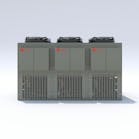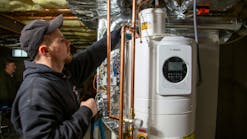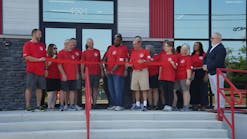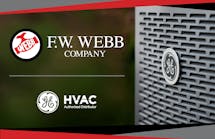The deadline for this column was the day after HARDI's second Congressional Fly-In was completed. HARDI members who did not attend should be sure to thank those who did, as it was a very successful event that effectively promoted the best interests of HVACR wholesale distributors. Despite a host of business issues such as “Card Check,” estate tax policy and mandatory paid leave, to name a few, HARDI distributor interests are linked most closely in many ways to the next form of energy and environment bills that are expected to come forth this year. Businesses across all lines of trade, of all sizes and in all positions in their respective supply chains will also be protecting their interests regarding the business issues as employers, owners and entrepreneurs, and HARDI is an important voice in that community. But when it comes to energy efficiency and climate change policy, there is no other voice for HVACR distributors and perhaps few other businesses so directly affected.
One of the loudest messages delivered by HARDI members to legislators in late April was that energy efficiency should be the primary strategy for reducing greenhouse gas emissions and that the HVACR industry is one of the key pieces to that puzzle. In late March, the House Energy and Commerce Committee released a Discussion Draft of a combined energy and climate change bill intended to link energy efficiency improvements to a carbon cap-and-trade system for reducing greenhouse gas emissions. While sound in general theory — that energy efficiency is an essential requirement for any emission reduction plan — most of the Draft's efficiency provisions are built on excessive mandates or unrealistic goals that will impede energy-efficiency efforts as well as a cap, auction and phasedown plan for hydrofluorocarbons (HFCs).
The odd juxtaposition of aggressive energy-efficiency mandates that undoubtedly require the use of high-efficiency, HFC-using air-conditioning and refrigeration systems with an HFC phasedown scheme that promises little more than rampant HFC price inflation, and an uncertain HFC supply seems to be an example of the link between energy efficiency and emission reductions not yet passing the rhetoric stage in Washington. HARDI's recommendations for a more effective, comprehensive energy and emission reduction plan are simple:
-
Continue to expand residential HVACR efficiency incentives with less- stringent qualifying ratings to better reach the average American household, the greatest source of conservation potential.
-
Provide real incentives for commercial upgrades and early retirements of HVACR systems, such as eligibility for expensing, bonus depreciation and accelerated depreciation (see “Cool and Efficient Buildings Act” below).
-
Omit HFCs from any form of carbon cap-and-trade system because HFCs represent less than two percent of total U.S. greenhouse gas emissions and are essential components of the most-efficient HVACR systems.
-
Do not rely on increasingly stringent or aggressive building codes and appliance standards to achieve significant energy savings but rather provide incentives for compliance upgrades and enforcement of current codes and standards.
HARDI and our industry partners have been effective making this argument. The 2009 Congressional Fly-In provided the stage for Illinois Congresswoman Melissa Bean to announce the reintroduction of H.R. 2198, “The Cool and Efficient Buildings Act,” which would qualify the installation of high-efficiency HVACR equipment for an accelerated depreciation of 20 years, a vast improvement from today's 39-year period. All HARDI members need to be urging their representatives to co-sponsor and support this first step toward real efficiency improvements in the commercial buildings sector. Those serious about reducing greenhouse gas emissions need to start focusing their attention on drivers of energy efficiency. Those serious about avoiding a destructive HFC cap-and-trade system or a larger carbon scheme had better start doing everything possible to deliver energy savings, not the least of which is getting your legislators on the same page.
Talbot Gee is vice president of HARDI. Contact him at 614/345-4328 or [email protected].








